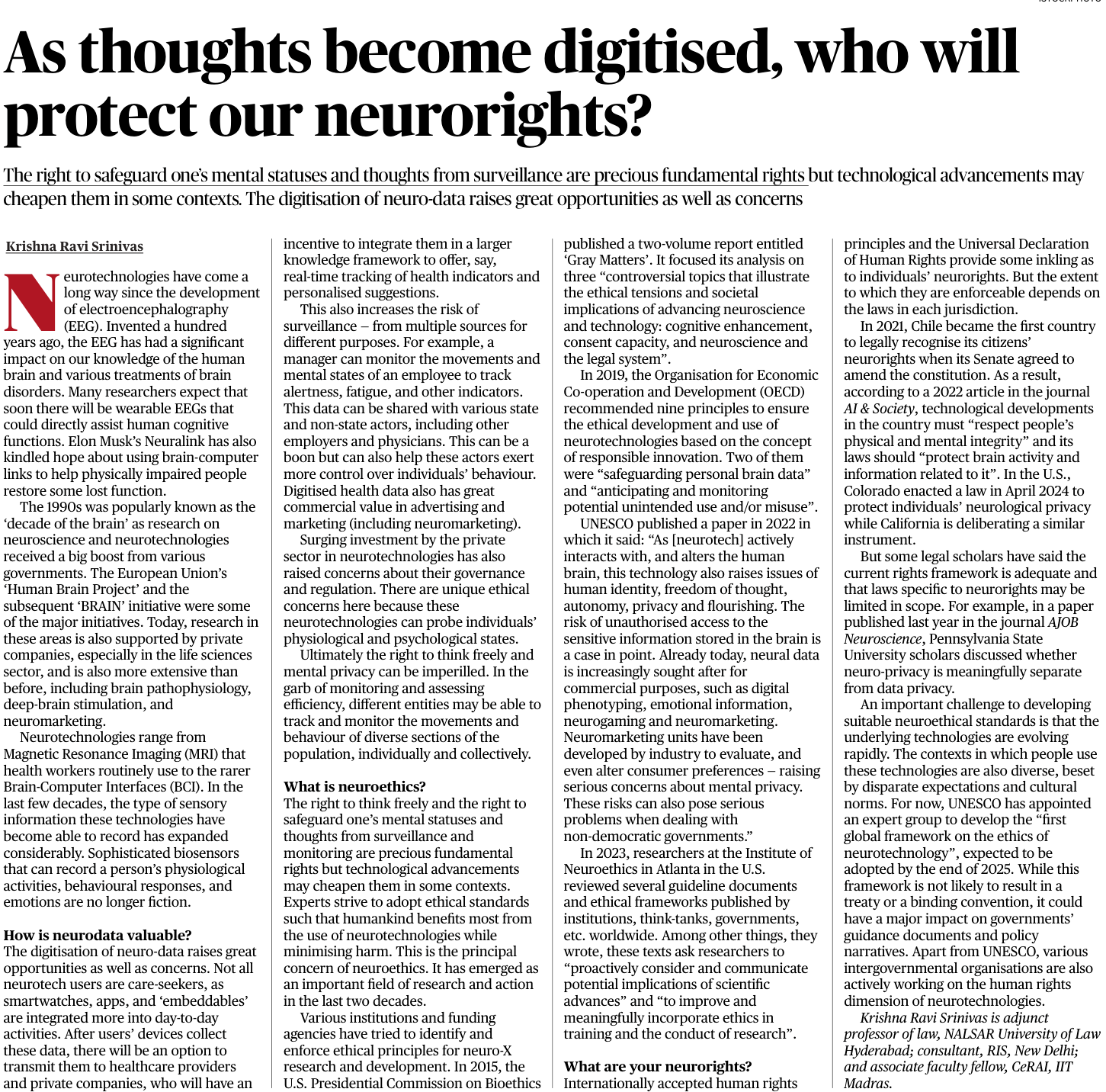Table of contents
Article: The Hindu

What are Neurorights?
Neurorights refer to the proposed set of rights aimed at protecting individuals' mental privacy, personal identity, and free will in the context of advancing neurotechnology. As brain-computer interfaces (BCIs) and other neurotechnologies evolve, they raise significant ethical, legal, and social concerns.
Here’s a detailed explanation:
Definition and Importance
- Neurorights are a set of human rights specifically designed to protect individuals from potential abuses and ethical dilemmas arising from neurotechnologies.
- These rights are crucial as they address the unique challenges posed by technologies that can access, interpret, and potentially manipulate brain activity.
Key Neurorights

- Mental Privacy: Protects individuals from unauthorized access to their thoughts and neural data.
- Personal Identity: Ensures that neurotechnologies do not alter an individual's sense of self or personal identity.
- Free Will: Safeguards the autonomy of individuals, ensuring that their decisions and actions are not unduly influenced by external neurotechnological interventions.
- Equal Access: Advocates for equitable access to neurotechnologies, preventing socio-economic disparities in their availability and use.
- Protection from Algorithmic Bias: Ensures that AI and algorithms used in neurotechnologies do not perpetuate biases or discrimination.
Technological Context
- Brain-Computer Interfaces (BCIs): Devices that enable direct communication between the brain and external devices. Companies like Neuralink, Synchron, and Precision Neuroscience are at the forefront of developing BCIs.
- Electroencephalography (EEG): A technology that records electrical activity of the brain, used in both medical and research settings.
- Deep Brain Stimulation (DBS): A medical procedure involving the implantation of electrodes in the brain to treat neurological conditions like Parkinson's disease.
Ethical Concerns
- Privacy: Unauthorized access to neural data could lead to breaches of mental privacy, exposing individuals' thoughts and intentions.
- Manipulation: There is a risk that neurotechnologies could be used to manipulate thoughts, emotions, or behaviors, infringing on personal autonomy.
- Identity: Alterations to brain function could impact an individual's sense of self, raising concerns about identity and authenticity.
- Equity: Disparities in access to neurotechnologies could exacerbate existing social inequalities.

Neurotechnology, encompassing devices and methods that interact with the nervous system, holds immense potential for both medical and non-medical applications. However, it also presents significant risks that need to be carefully managed. Here’s a detailed overview:
Potential Benefits
- Medical Advancements
- Treatment of Neurological Disorders: Neurotechnologies like Deep Brain Stimulation (DBS) and Brain-Computer Interfaces (BCIs) can treat conditions such as Parkinson's disease, epilepsy, and depression.
- Rehabilitation: BCIs can aid in the rehabilitation of stroke patients by helping them regain motor functions.
- Prosthetics Control: BCIs enable individuals with amputations to control prosthetic limbs using their thoughts, significantly improving their quality of life.
- Enhanced Cognitive Abilities
- Memory Enhancement: Research is ongoing into technologies that could enhance memory and cognitive functions, potentially benefiting individuals with memory impairments.
- Learning and Skill Acquisition: Neurotechnologies could accelerate learning processes and skill acquisition, offering new educational tools.
- Communication
- Assistive Communication Devices: For individuals with severe disabilities, BCIs can facilitate communication by translating neural signals into speech or text.
- Restoration of Speech: Technologies are being developed to help individuals who have lost the ability to speak due to conditions like ALS (Amyotrophic Lateral Sclerosis).
- Mental Health
- Mood Regulation: Neurostimulation techniques can help regulate mood and treat mental health conditions such as depression and anxiety.
- Addiction Treatment: Neurotechnologies can be used to modulate brain circuits involved in addiction, offering new treatment avenues.
- Research and Understanding
- Brain Mapping: Advanced neurotechnologies enable detailed mapping of brain functions, contributing to our understanding of the brain and its disorders.
- Neuroscience Research: These technologies provide powerful tools for studying brain activity and developing new treatments for neurological conditions.
Potential Risks
- Privacy Concerns
- Mental Privacy: Unauthorized access to neural data could lead to breaches of mental privacy, exposing individuals' thoughts and intentions.
- Data Security: The sensitive nature of neural data necessitates robust security measures to prevent hacking and misuse.
- Ethical and Social Implications
- Manipulation: There is a risk that neurotechnologies could be used to manipulate thoughts, emotions, or behaviors, infringing on personal autonomy.
- Identity and Authenticity: Alterations to brain function could impact an individual's sense of self, raising concerns about identity and authenticity.
- Consent: Ensuring informed consent for neurotechnology interventions, especially in vulnerable populations, is a significant ethical challenge.
- Health Risks
- Surgical Risks: Implantable neurotechnologies involve surgical procedures that carry risks such as infection, bleeding, and adverse reactions.
- Long-term Effects: The long-term effects of neurotechnologies on brain health are not fully understood, necessitating ongoing research and monitoring.
- Equity and Access
- Disparities in Access: Socio-economic disparities could limit access to beneficial neurotechnologies, exacerbating existing inequalities.
- Cost: High costs associated with advanced neurotechnologies could restrict their availability to affluent individuals or regions.
- Regulatory and Legal Challenges
- Lack of Regulation: Rapid advancements in neurotechnology may outpace regulatory frameworks, leading to gaps in oversight and protection.
- Legal Accountability: Determining legal accountability for actions influenced by neurotechnologies presents complex legal challenges.
- Psychological Impact
- Dependence: Over-reliance on neurotechnologies could lead to psychological dependence and reduced natural cognitive abilities.
- Mental Health: The use of neurotechnologies could have unintended psychological effects, such as anxiety or altered self-perception.
Legal and Policy Frameworks
- International Initiatives: Countries like Chile have proposed constitutional amendments to include neurorights, making it the first country to take such a step.
- Regulatory Bodies: Organizations like the World Health Organization (WHO) and the United Nations (UN) are beginning to address the implications of neurotechnologies.
- National Policies: Different countries are at various stages of developing policies to regulate neurotechnologies and protect neurorights.
Future Directions

- Research and Development: Ongoing research is crucial to understand the full implications of neurotechnologies and develop safeguards.
- Public Awareness: Educating the public about neurorights and the ethical implications of neurotechnologies is essential.
- Interdisciplinary Collaboration: Collaboration between neuroscientists, ethicists, policymakers, and technologists is necessary to create comprehensive frameworks for neurorights.
Conclusion
Neurorights represent a critical area of focus as neurotechnologies continue to advance. Protecting mental privacy, personal identity, and free will is essential to ensure that these technologies benefit society without compromising fundamental human rights. As this field evolves, continuous dialogue and proactive policy-making will be key to addressing the ethical and legal challenges posed by neurotechnologies.

